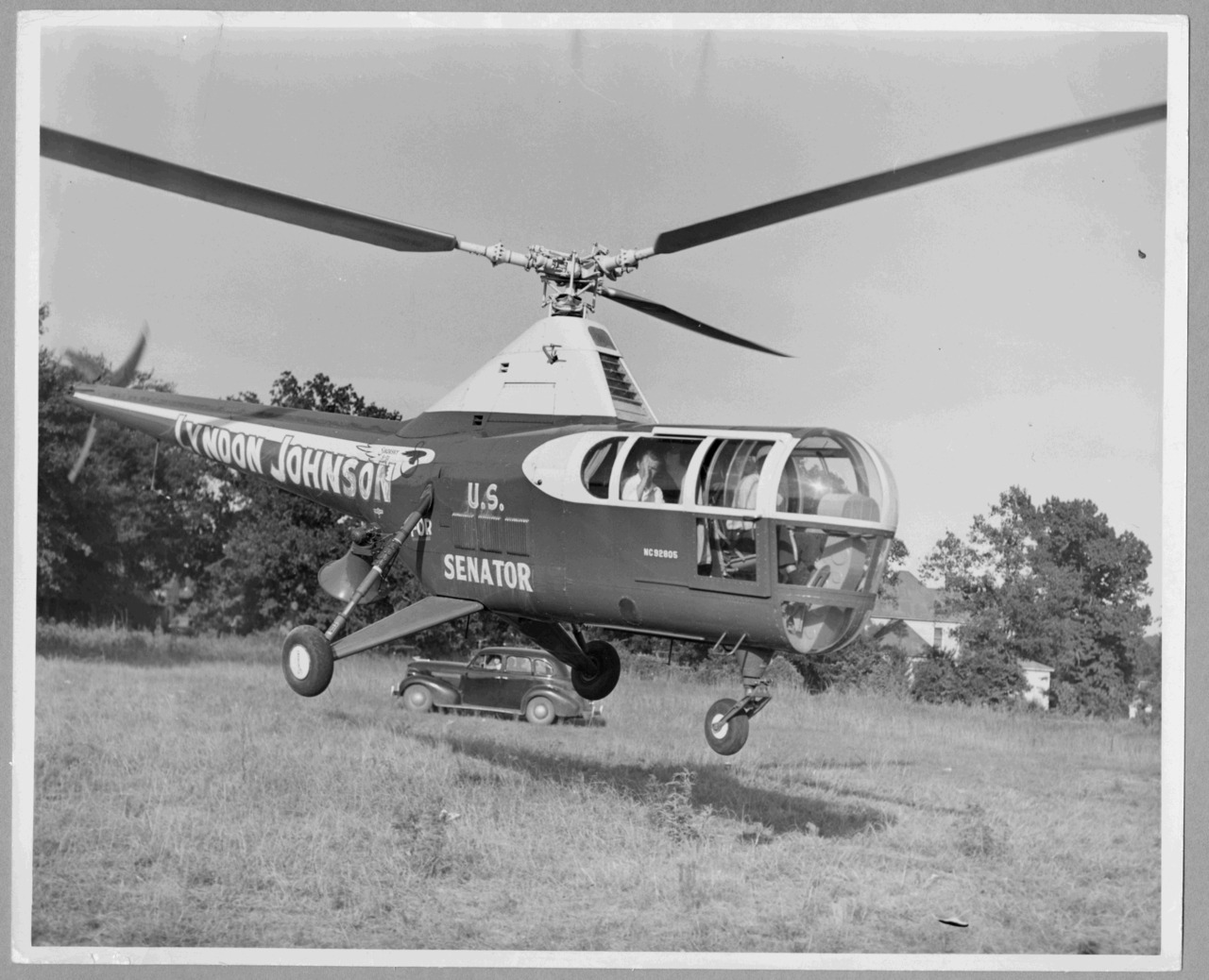Means of Ascent ends on Lyndon Johnson’s 1948 Senate campaign. He spends a lot of money and goes all around Texas on a helicopter, which was still a new corn-traption at the time so everyone was quite amazed.
Johnson ended up winning because he bought tens of thousands of votes with the help of a crook-type gent in the Rio Grande Valley. But when the election was over he was still about 800 votes short, so there was some more trickery and six days after the election he came up with some extra votes and won by 87.
A little while before the helicopter, he has a terrible kidney stone that he can’t pass, but he doesn’t want to get surgery because with the recuperation and all it will end his campaign. Here he is in a Pullman car, traveling from Austin to Dallas, with a twenty-five year old aide named Warren Woodward:
By this time, his temperature soaring, Johnson was suffering alternately from what Bolton says were “the most severe fever and chills I had ever seen,” and throughout the night Johnson would shout across the aisle: “Woody!” Jumping up, in his pajamas, Woodward would cross the aisle, and open the drapes curtaining off Johnson’s berth. “Get this window open!” Johnson would say, and Woodward would see that sweat was pouring off him from his fever. “Finally,” Woodward recalls, “the fever would pass and he’d maybe doze off for a little bit.” Woodward would close the window. Then a chill would come. The chills were very bad. “He was just shaking uncontrollably.” Woodward got the porter to collect all his spare blankets and pile them on Johnson, but they didn’t help. “I’m freezing, Woody! I’m freezing!” Johnson would cry. He asked Woodward to get into bed with him, and Woodward did, and wrapped his arms around him “to try to give some heat from my body over to his and try to keep him warm.” Then “when he would start the perspiring period,” Johnson would order Woody, “Get this window open!” and then, after a while, shaking and shivering with cold again, he would order Woody to get back into his berth and hug him again. Sometimes Johnson would doze, and Woodward would return to his own berth, but he never got more than a few minutes’ rest before Johnson’s voice would be shouting “Woody!” across the aisle.
When they’re in Dallas things get so bad that Johnson agrees to go to a hospital:
As Johnson had entered the hospital, he had said to Woodward, “Don’t leave me, Woody.” The faithful Woodward stayed at his side—except as Johnson was being wheeled to his room. A nurse had insisted that Woodward fill out the admittance forms, and Woodward had stopped—“maybe as long as five minutes”—to do so. But it was during those five minutes that Johnson vomited. When Woodward reached him, Johnson said, “Woody, don’t ever do that to me again!” The astonished Woodward didn’t know what he had done. “You left me,” Johnson said. When Woodward tried to explain that the nurse had insisted he fill out the forms, Johnson said, “I don’t care. You don’t work for her, you work for me. You stay with me. I called you and you weren’t there. I don’t want you to leave me. Don’t leave me when I need you.” Thirty-six years later, when Woodward was being interviewed, he was still laboriously trying to excuse his lapse: “He didn’t really need me. He had thrown up and soiled himself, and it was a sort of messy situation, but he had orderlies and nurses and ail sorts of people to handle it, and he was well cared for. I was maybe gone as long as five minutes. It was indicative of the fact that he didn’t like to be left alone.…”)
Finally, they have to fly to the Mayo Clinic:
Taken to Love Field in an ambulance, Johnson was placed on a bed that had been made up in Miss Cochran’s Electra, and flown to Minnesota. (Although being moved had intensified his pain again, Johnson remained in command of his staff—even if it consisted of only a single aide. During the flight, Miss Cochran came back to check on the patient and told Woodward, who had been chatting with her about the thirty-five missions he had flown over Europe during the war, to sit in her pilot’s seat while the co-pilot flew the plane. Johnson, who had been dozing, awoke and saw Woodward sitting in the pilot’s seat. Rapping sharply on a table, he got Woodward’s attention, and when the young man hurried back, snapped, “Woody, don’t we have enough problems without you trying to fly this plane?”)
